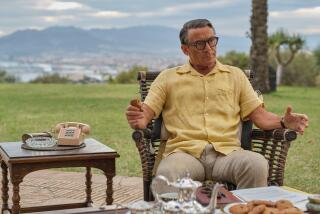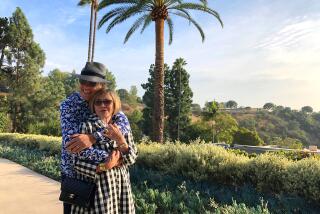An empire’s end, and childhood’s too
- Share via
Actor Richard E. Grant makes his feature writing-directing debut with the semiautobiographical drama “Wah-Wah,” which is both acidly funny and very moving. Described as a “coming of age at the end of an age” story, the film is set in late-1960s Swaziland on the verge of its independence.
The memories are more bitter than sweet for Grant, best known for roles in films such as “Withnail & I,” “The Age of Innocence” and “Gosford Park,” as he recalls the domestic turmoil growing up in the Southeast African British protectorate. Things almost immediately begin to go badly for his fictional proxy, Ralph Compton (Zachary Fox), son of the minister of education, when he inadvertently witnesses his mother, Lauren (Miranda Richardson), committing adultery in the front seat of a car.
Twelve-year-old Ralph is further traumatized and left alone with his father, Harry (Gabriel Byrne), when his mother leaves with her paramour, another member of the hypocritically judgmental British colony. Unable to cope with the loss of his wife, Harry packs Ralph off to boarding school and takes solace in alcohol.
Two years later, Ralph has sprouted into a lanky teen, now played by Nicholas Hoult, who taught Hugh Grant a thing or two in “About a Boy.” When Ralph returns home from school on a break, he discovers Harry has impetuously married again, to a loud American former air hostess named Ruby, played by the beguiling Emily Watson.
Ralph tries hard not to like Ruby but finds that she understands him far better than either of his parents, and they become necessary allies when Harry’s drinking turns him into a Jekyll and Hyde personality. By day, he is the charming backslapping politico, but at night, when the liquor cabinet opens, he’s a vicious drunk.
Ruby provides Grant the most ammunition with which to skewer the colonials. As an outsider, she brings a fresh perspective and leaps at every chance to point out their contradictions. It’s Ruby who mocks the upper-class slang that’s spoken, the “toodle-pips” and “hobbly-jobblys” that sound like so much “Wah-Wah” to her.
Against a certain nostalgia for a period when the sun was definitely setting on the empire, Grant balances a sharp satire of the “hoity-toity” Brits with a tender memoir of the dissolution of his family. His depiction of the cloistered social scene where adultery is rampant but a divorcee is shunned is tremendously engaging. In his writing, Grant makes use of the same keen sense of observation that made his published film diaries, “With Nails,” and novel, “By Design,” so amusing.
He also shows that his time on the sets of directors Bruce Robinson, Robert Altman, Francis Ford Coppola and Martin Scorsese, and others, was well spent. The film is crisply directed and well-paced, making good use of African panoramas to give the hothouse drawing room scenes space to breathe. And like many actors who turn to directing, Grant has assembled an excellent cast, which includes Julie Walters and Celia Imrie.
A wry and involving film, “Wah-Wah” is clearly a labor of love for both Grant and his cast. Grant opens up his life, not with embarrassment or explanation but with humanity and gratitude. Emotional, melodramatic and sentimental, the film unabashedly wears its heart on its sleeve, and is the better for it.
*
‘Wah-Wah’
MPAA rating: R for some language and brief sexuality
A Roadside Attractions and Samuel Goldwyn Films presentation. Writer-director Richard E. Grant. Producers Marie-Castille Mention-Schaar. Pierre Kubel and Jeff Abberley. Director of photography Pierre Aim. Editor Isabelle Dedieu. Costume designer Sheena Napier. Music Patrick Doyle. Production designer Gary Williamson. Running time: 1 hour, 37 minutes.
At selected theaters.
More to Read
Only good movies
Get the Indie Focus newsletter, Mark Olsen's weekly guide to the world of cinema.
You may occasionally receive promotional content from the Los Angeles Times.











